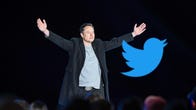Twitter advertising executives made little more than a veiled allusion to how Elon Musk, a self-styled “free-speech absolutist,” is poised to take over Twitter as the company made its flashiest pitch of the year to marketers and brands Wednesday, praising advertisers as its trusted partners who “stand with us.”
“It has been a quiet month at Twitter,” JP Maheu, leader of the company’s global client solutions team, quipped as he opened Twitter’s NewFront, presaging how little the presentation would address the Musk takeover saga that has been making headlines for weeks. The NewFronts are a weeklong parade of presentations by online media companies to drum up advertiser interest.
As part of Twitter’s presentation, the company announced it had partnered with Fox Sports for special programming for the FIFA men’s and women’s World Cups, with in-match previews and live prematch shows. Twitter also revealed a pilot program coming later this year that would let advertisers run ads in new ways on live-event pages. And it announced new or extended partnerships with publishers Conde Nast, Essence, E! News and Revolt, as well as with the WNBA.
Advertising is the lifeblood of Twitter’s business — last year, 89% of its revenue came from ads — but Musk’s planned purchase is the kind of change that makes advertisers jittery. The mercurial entrepreneur heightens uncertainty about the shape of Twitter to come, and, more significantly, he has been vocal (if vague) in advocating greater freedom of speech on the social network.
To advertisers, more freedom of speech translates to looser content moderation. It’s the kind of risk that sends many advertisers running, should policy changes end up raising the chances that objectionable posts or toxic conversations run alongside a carefully constructed brand message.
After media reports in 2017 exposed examples of YouTube’s automated software sticking ads next to clips heavy on racism or other objectionable content, angry advertisers pulled out of Google’s video site in a widespread boycott, including giant brands like Pepsi, Walmart and AT&T. (Then, when YouTube responded by more aggressively demonetizing sensitive clips, it ended up outraging people who uploaded videos that seemed fine but still inexplicably lost their moneymaking power. Creators dubbed it “adpocalypse.”)
As its future owner, Musk’s influence on content moderation isn’t clear. Twitter has said that its policy decisions aren’t determined by its board or shareholders and that it has no plans to reverse any existing policies.
But Musk’s criticism of Twitter’s content moderation was a pillar of his roller-coaster bid for more control of the company. Musk tweeted a poll to his followers in March, asking whether Twitter was rigorously protecting free speech. The First Amendment, though, doesn’t bar companies from restricting speech. He followed up saying the consequences of the poll, in which roughly 70% of 2 million respondents voted “no,” would be “very important.”
He made his offer to buy Twitter three weeks later.

